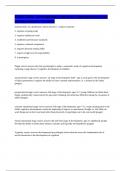-
1. Exam (elaborations) - Chapter 7 educ 1300 quiz(100% verified)
-
2. Exam (elaborations) - Edu 201 exam(100% guaranteed)
-
3. Exam (elaborations) - Educ 101(completely solved)
-
4. Exam (elaborations) - Educ 136(100% everfree answers)
-
5. Exam (elaborations) - Educ 215(a+ graded)
-
6. Exam (elaborations) - Educ 387(complete solutions)
-
7. Exam (elaborations) - Educ 1300 ch. 4 (100% guaranteed)
-
8. Exam (elaborations) - Educ 1300 chapter 1(100% verified)
-
9. Exam (elaborations) - Educ 1300 chapter 1,3,5&6(complete solutions)
-
10. Exam (elaborations) - Educ 1300 chp 1-4 8&9(completely solved)
-
11. Exam (elaborations) - Educ 1300 exam #2 review ch 5-7(100% correct answers)
-
12. Exam (elaborations) - Educ 1300 exam #2(correct answers)
-
13. Exam (elaborations) - Educ 1300 exam 1 ch 1-5(all accurately solved)
-
14. Exam (elaborations) - Educ 1300 exam 1 - chapter 1(a+ guaranteed answers)
-
15. Exam (elaborations) - Educ 1300 exam 3, chapters 7, 8 & 9(all solved)
-
16. Exam (elaborations) - Educ 1300 final exam hcc (with solved solutions)
-
17. Exam (elaborations) - Educ 1300 final exam(a+ graded)
-
18. Exam (elaborations) - Educ 1300 final review(correctly solved)
-
19. Exam (elaborations) - Educ 1300 learning framework(100% guaranteed)
-
20. Exam (elaborations) - Educ 1300 midterm review(with errorless answers)
-
21. Exam (elaborations) - Educ 1300 midterm(100% correct answers)
-
22. Exam (elaborations) - Educ 1300 syllabus (correctly solved)
-
23. Exam (elaborations) - Educ 1300 test 1(with errorless answers)
-
24. Exam (elaborations) - Educ 1300 test 4 chapter 10, 11 & 12(all answered)
-
25. Exam (elaborations) - Educ 1300 unit 1(all accurately solved)
-
26. Exam (elaborations) - Educ 1300 unit 2(a+ guaranteed answers)
-
27. Exam (elaborations) - Educ 1301 chapter 1 2 3 questions(100% correct answers)
-
28. Exam (elaborations) - Educ 1301 chapter 12,13,14,15 final(all solved)
-
29. Exam (elaborations) - Educ 1301 final exam review(100% everfree answers)
-
30. Exam (elaborations) - Educ 1301(a+ guaranteed answers)
-
31. Exam (elaborations) - Educ 1300(a+ graded)
-
32. Exam (elaborations) - Educ 1301 (100% verified)
-
33. Exam (elaborations) - Educ 1300(a+ guaranteed answers)
-
34. Exam (elaborations) - Educ 1300(with solved solutions)
-
35. Exam (elaborations) - Educ 1300(all accurately solved)
-
36. Exam (elaborations) - Educ 2110 - investigating critical & contemporary issues in education(a+ graded)
-
37. Exam (elaborations) - Educ 2130: exploring learning & teaching(100% guaranteed)
-
38. Exam (elaborations) - Educ 13000(with solved solutions)
-
39. Exam (elaborations) - Educ chapter 1 (complete solutions)
-
40. Exam (elaborations) - Educ chapter 2 (completely solved)
-
41. Exam (elaborations) - Educ chapter 4(with solved solutions)
-
42. Exam (elaborations) - Educ chapter 5(all answered)
-
43. Exam (elaborations) - Educ chapter 7(complete solutions)
-
44. Exam (elaborations) - Educ chapter 10 (correctly solved)
-
45. Exam (elaborations) - Educ exam 1 (correct answers)
-
46. Exam (elaborations) - Educ exam 2 (all solved)
-
47. Exam (elaborations) - Educ exam 2 (correct answers)
-
48. Exam (elaborations) - Educ final exam (correctly solved)
-
49. Exam (elaborations) - Educ final exam (100% verified)
-
50. Exam (elaborations) - Educ-1300 test 1 (with errorless answers)
-
51. Exam (elaborations) - Educ-200 exam 1(all answered)
-
52. Exam (elaborations) - Educ. 200(100% correct answers)
-
Show more




